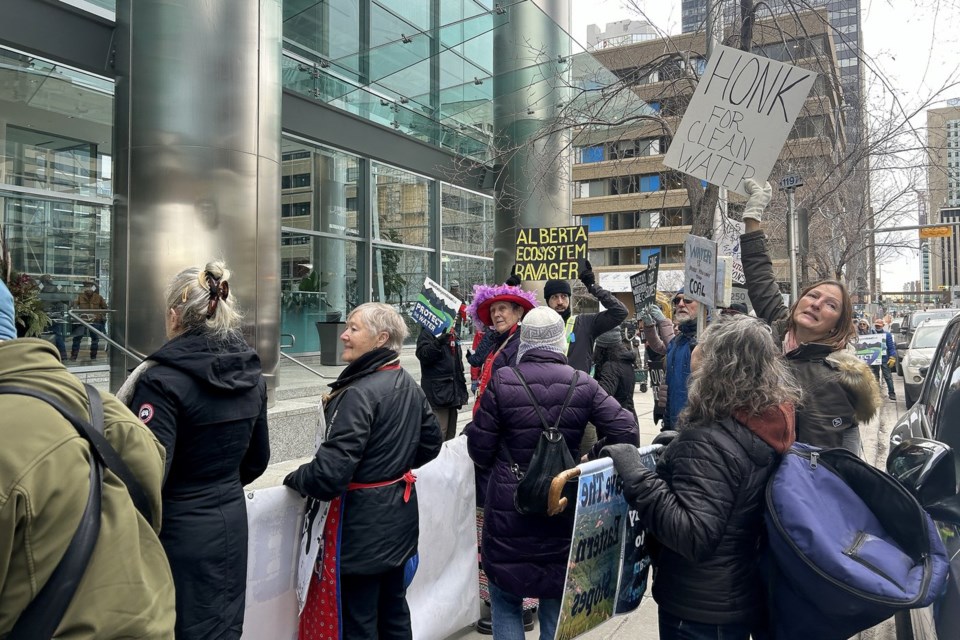CALGARY — The final days of hearings into a contentious coal exploration project in southwestern Alberta were met with protests in downtown Calgary on Tuesday.
Honking vehicles and chants were the backdrop to Alberta Energy Regulator hearings weighing a potential coal exploration project in Crowsnest Pass.
"We had a decent year for rain this year, but it's all surface. The aquifers are running dry," said Lance Loree, a third-generation rancher from Nanton, Alta.
Standing outside AER headquarters in a cowboy hat and leather duster jacket, he said he's concerned about water availability as multi-year drought conditions persist in farm-heavy southern Alberta.
The hearing is the last opportunity for public input before the energy regulator decides whether Australian-owned Northback Holdings Corp. can move forward with a temporary exploratory drilling program and acquire a licence to divert water to the Grassy Mountain coal mine in the Rocky Mountains.
The project, which a regulatory panel rejected in 2021, has been revived in the past year and has led to stark divisions between those keen on the project's economic boost and those concerned about its ecological impacts.
Crowsnest Pass residents recently voted in favour of the project in a non-binding referendum, which saw 53 per cent of the eligible voters turn out. Northback said it would carry out the exploration project to meet all environmental and regulatory requirements, a commitment it believes was successfully communicated to Crowsnest Pass residents.
"We were able to help them understand that we can indeed meet all the regulatory requirements put in place to protect the safety of Albertans, residents, the water and the environment," Rina Blacklaws, spokesperson for Northback, said in an interview. The company says the exploration program would use water from previously mined end-of-pit lakes and would not be connected to nearby bodies of water.
But critics — including Loree and several southern Alberta residents who attended Tuesday's protest — are concerned about issues like drought and water contamination.
The panel that rejected the exploration project said the mine's likely environmental effects on the fish and water quality outweighed what it called the low to moderate positive economic impacts of the project. In 2022, the Alberta Court of Appeal and the Supreme Court of Canada declined to hear challenges to the rejection.
The mine was exempted from Alberta's recent decision to ban mountaintop removal and open-pit coal developments, as the province deemed it an advanced proposal.
Chris Spearman, the former mayor of Lethbridge, Alta., said the referendum in Crowsnest Pass represented only a small portion of the people who stand to be affected by the project, adding that prior court rulings mean it should not currently be a live issue.
"Three years ago, the risks associated with this coal mine on this site far exceeded the benefits. The answer shouldn't even be at a hearing," Spearman said at the protest.
Dimples Stump, councillor for the Piikani First Nation, said many of her fellow councillors have been reluctant to stand against the project. The Piikani and Stoney Nakoda First Nations argued in 2022 that the courts had failed to consider the economic benefits they would receive from the development. Representatives from the Piikani First Nation are to speak at Wednesday's hearing.
"It is a really tense situation," Stump said.
"We all need to be worried this is going to contaminate our water."
The project's fate is to be decided within 90 days of hearings wrapping up.
This report by The Canadian Press was first published Jan. 14, 2025.
Matthew Scace, The Canadian Press



